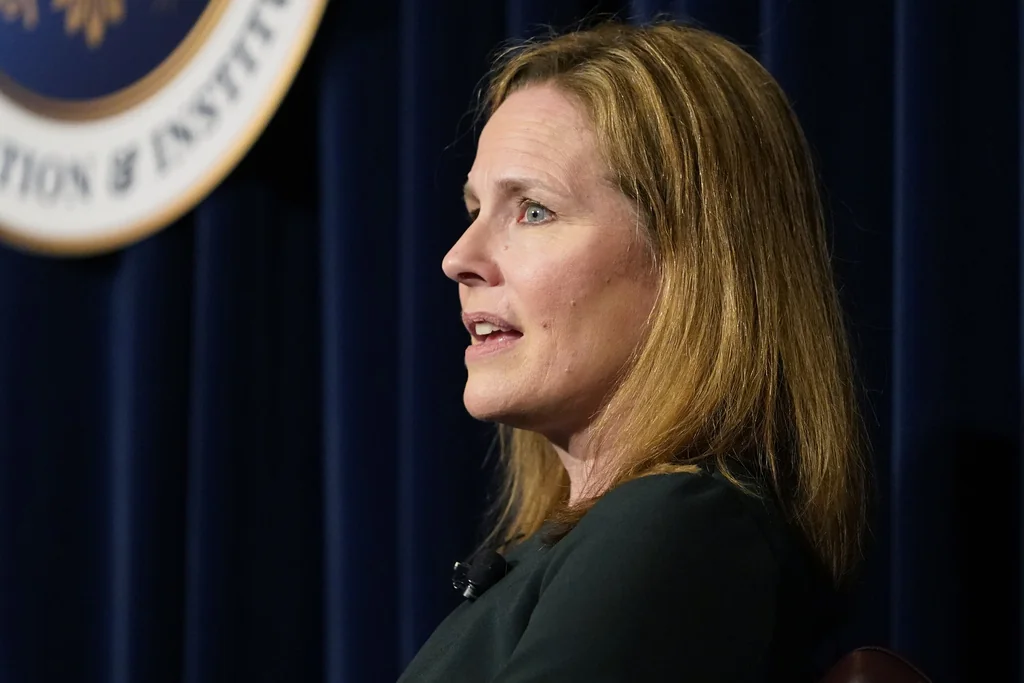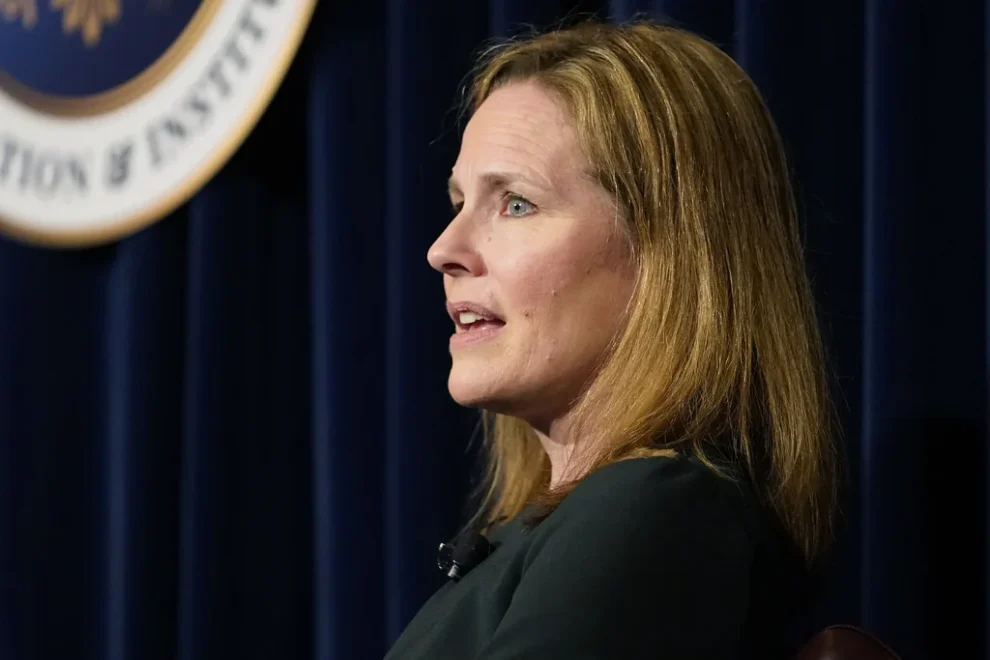A pair of high-profile recusals by Supreme Court justices last week reignited a fierce debate over judicial ethics, particularly following Justice Amy Coney Barrett’s withdrawal from a major religious liberty case.
Barrett, an appointee of President Donald Trump, chose earlier this year to recuse herself from a case surrounding the approval of the country’s first state-funded religious charter school. That choice led the high court to hand down a deadlocked ruling last week, giving a procedural win to opponents of faith-based charter schools, namely Oklahoma‘s Republican Attorney General Gentner Drummond, who sued to block state funds for the virtual Catholic school.

The justices split 4-4 in Oklahoma Statewide Charter School Board v. Drummond, effectively upholding a decision from Oklahoma’s highest court that blocked the establishment of the country’s first Catholic charter school. The unsigned order, issued without explanation, leaves the state court’s sweeping interpretation of the Establishment Clause in place, treating per-student-funded, independently operated religious charter schools as unconstitutional.
Legal experts widely believe her decision to recuse, announced in January, could have stemmed from her past ties to Notre Dame Law School, which hosts a Religious Liberty Clinic involved in the case. The justice did not make her reasoning known publicly, but Barrett was a law professor at the university and has a personal friendship with law professor Nicole Garnett, a fellow faculty member involved in the clinic.
Carrie Severino, president of the conservative advocacy group Judicial Crisis Network, told the Washington Examiner that Barrett’s recusal, while likely made in good faith, risks setting a dangerous precedent.
“Justices of the Supreme Court have a duty to sit and hear the cases so that we can have a functioning and consistent court, so that we can avoid gamesmanship of people attempting to strategically induce recusals,” Severino said. “That is even more important in an era like today, where recusals are being actively weaponized to undermine the integrity of the court.”
“Justice Barrett’s decision to recuse from the St. Isidore case was presumably a result of her friendship with Nicole Garnett, who was neither a counsel nor a party in the case,” Severino added. “It seems this goes beyond her duty to recuse, which could have pernicious long-term consequences if other justices were to do the same.”
Garnett declined to discuss the matter, telling the Washington Examiner she has a “blanket policy” against discussing Barrett.
John Shu, a constitutional law scholar and former official in both Bush administrations, emphasized that recusal decisions are discretionary and generally hinge on whether a justice has a direct financial interest in the case.
“If the answer is no, then I don’t really think a recusal is necessary,” Shu said, referring to recusals broadly. On the St. Isidore case, he noted that while it is widely assumed Barrett would have sided with the religious school, that doesn’t mean her participation would have guaranteed a different outcome. “Just because Barrett is uber-Catholic, it is not clear to me that she would have voted in favor of St. Isidore had she not recused from the case.”
Yet Barrett’s absence remains notable given her track record on religious liberty issues.
Conservative court watchers lamented the missed opportunity to establish a national precedent favoring religious charter school access. “Supreme Court recusals have real national costs,” wrote Dan McLaughlin in National Review. “Which is why they should be used so sparingly.”
In contrast to Barrett’s cautious step back, court watchers largely suggested that Justice Ketanji Brown Jackson made the right call in 2022 when she did not weigh in on the landmark case that overturned affirmative action the following year. The justices heard separate arguments surrounding lawsuits at the University of North Carolina, Chapel Hill, which Jackson participated in, and the suit involving Harvard University, which she recused. Jackson, still fresh off of former President Joe Biden’s appointment at the time, was previously a member of the Harvard Board of Overseers before joining the high court. Because the case rulings came down along 6-3 and 6-2 lines, respectively, her absence did not make much difference.
Barrett’s decision also stood out because she previously participated in cases involving the same Notre Dame clinic.
Writing for Reason’s Volokh Conspiracy, Professor Josh Blackman argued that if the clinic alone wasn’t enough to trigger recusal in those past instances, it likely wasn’t the driving factor. “Ultimately, I am not certain the cause of Barrett’s recusal,” Blackman wrote. “But the clinic, standing apart from Garnett, should not trigger a recusal.”
Barrett wasn’t the only justice stepping aside last week. On Monday, the Supreme Court announced it would not hear Baker v. Coates, a copyright case involving author Ta-Nehisi Coates and Penguin Random House, after five justices — Barrett, Neil Gorsuch, Jackson, Sonya Sotomayor, and Samuel Alito — recused, leaving the high court without a quorum. Most of the recusals were linked to the justices’ book contracts with the publishing house. Alito’s reasoning was not disclosed.
Fix the Court, a liberal-leaning ethics watchdog, praised the collective withdrawal, claiming that the justices had finally met basic conflict-of-interest expectations. But critics warned that increasingly frequent recusals threaten to paralyze the Supreme Court.
The ethics furor comes amid a renewed push by Sen. Sheldon Whitehouse (D-RI), who reintroduced his Supreme Court Ethics, Recusal, and Transparency Act last week. The bill would impose a binding code of conduct, force public disclosure of recusal reasons, and create a lower court panel to oversee complaints, but it faces virtually no path forward in the GOP-controlled Senate.
Whitehouse, who has long targeted Republican-appointed Justices Clarence Thomas and Samuel Alito over alleged ethical lapses regarding friends with interests in high court matters, acknowledged the uphill battle.
“It’s still going to be difficult to make any meaningful progress on the bill, but it’s important,” he said last week, linking his effort to the Supreme Court’s ruling earlier this year granting Trump broad immunity for acts, according to Courthouse News Service.
While Democrats continue to pursue judicial reforms, Republican leaders have dismissed the push as a partisan attack on a high court they no longer control. Sen. Lindsey Graham (R-SC) previously called Whitehouse’s efforts “politically motivated legal garbage.”
SUPREME COURT DEADLOCKED ON OKLAHOMA CATHOLIC CHARTER SCHOOL FUNDING CASE
The Supreme Court’s voluntary code of ethics, adopted in 2023, has done little to ease tensions. With no enforcement mechanism, justices retain near-total discretion over when to sit and when to step aside, a reality that has conservatives increasingly worried about the cost of excessive caution.
“Recusals shouldn’t become a political weapon,” Severino warned. “Justices have a duty to sit and decide the hard cases, not step aside just to protect appearances.”
























